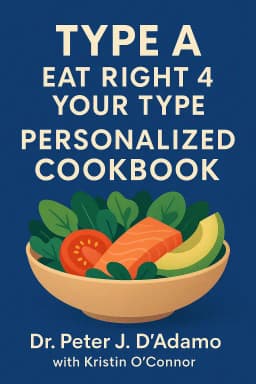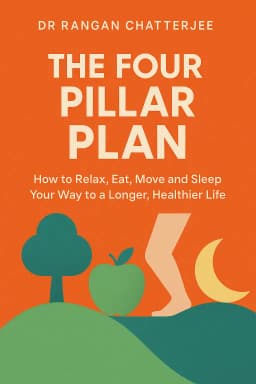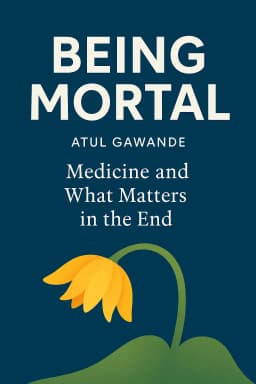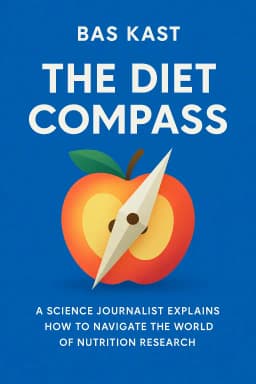
The 12-Minute Revolution: Debunking Fitness Myths for the Modern Creator
Golden Hook & Introduction
SECTION
Nova: What if I told you the most common advice in fitness—'more is better'—is not just wrong, but potentially dangerous? We idolize marathon runners, but ancient Greek legends and modern science tell a story of runners literally dropping dead from extreme exertion. This isn't about shaming cardio; it's about a fundamental misunderstanding of what 'exercise' truly is. And understanding this difference is the first step to eliminating the fear and anxiety around working out.
Dustin: That hook is exactly why I was so fascinated by this book. The whole fitness world feels built on that 'more is better' idea, and for someone with a packed schedule, it's incredibly intimidating. It creates this immediate sense of failure before you even start, because you think, "I can't possibly dedicate ten hours a week to this."
Nova: You've hit the nail on the head. It's a huge mental barrier. And that’s why we’re so excited to dive into the revolutionary book "Body by Science" today. We're going to tackle it from two powerful angles. First, we'll expose the great deception in the fitness world—why 'more' isn't always better. Then, we'll reveal the ultimate efficiency hack: how to get in phenomenal shape in just 12 minutes a week, backed by incredible science. And here with me to unpack this is actor and creator, Dustin. Welcome!
Dustin: Thanks for having me, Nova. I'm ready to have my entire worldview on fitness shattered.
Nova: Well, prepare for a paradigm shift! It's perfect for an analytical mind like yours.
Deep Dive into Core Topic 1: The Great Deception
SECTION
Nova: So, Dustin, you mentioned that feeling of intimidation. A lot of that comes from a flawed definition of what we're even trying to do. The book "Body by Science" draws this brilliant, sharp line between 'physical activity' and 'exercise'. They are not the same thing.
Dustin: Okay, I'm intrigued. How do they define them differently?
Nova: It’s simple but profound. Physical activity is just movement. Walking the dog, climbing stairs, playing a sport. But the book defines as a specific activity that stimulates a positive physiological adaptation to make you fitter and healthier, and—this is the key part— undermining your health in the process.
Dustin: Without undermining your health... That implies some activities we are healthy might actually be harmful.
Nova: Exactly. And the book uses some incredible historical stories to make this point. Let's go back to ancient Greece, 479 B. C. The Greeks have just won a major battle, but they need to bring sacred fire from the temple at Delphi. A man named Euchidas volunteers for the job.
Dustin: Sounds heroic.
Nova: Totally. He promises to be back before sunset. So he runs to Delphi and back, a distance of 125 miles, all in a single day. He arrives, hands over the flame to his fellow citizens, and then... he collapses and dies on the spot.
Dustin: Wow. So he was incredibly 'fit' by one measure—his endurance was off the charts—but that very act of extreme fitness completely destroyed his 'health.'
Nova: You got it. That's the perfect illustration. He traded his health for a feat of fitness. And the authors argue this happens on a smaller scale all the time. They cite modern research showing that up to 60 percent of runners get injured in an average year. The goal of exercise should be to make you fitter healthier, not to force a trade-off between the two.
Dustin: You know, this is already helping with the anxiety I feel about working out. The pressure to just 'do more'—run another mile, spend another hour—is gone. The new question becomes, 'What is the stimulus to apply?' That's a solvable, engineering-type problem. It's not an endless, grueling test of willpower.
Nova: I love that framing. It’s not about endurance; it’s about precision. You're not trying to wear yourself down; you're trying to send a specific signal to your body.
Dustin: Right. And as a creative, my mind is always 'on.' The idea of a long, mindless slog on a treadmill is draining. But a precise, targeted task? That feels like a puzzle to solve. It appeals to the INTJ in me. It gives me a sense of control and purpose, which is the opposite of what anxiety feels like.
Nova: That is the perfect transition to our next point. Because if the goal is finding the 'right stimulus,' then the next logical question is... what is the right?
Deep Dive into Core Topic 2: The 12-Minute Hack
SECTION
Nova: This is where the book goes from interesting to truly revolutionary. It's all about the concept of the "minimum effective dose." How little can you do to get the maximum possible result?
Dustin: The ultimate life hack. As a content creator, I'm all about return on investment. What's the ROI on our workout time?
Nova: Well, get ready for this. The book details these landmark studies from McMaster University in Canada. Picture this: researchers take a group of healthy college students and split them into two groups. Group one does traditional endurance training: 90 to 120 minutes of moderate cycling, three times a week. That's about four and a half to six hours a week.
Dustin: Sounds like a standard gym routine. A huge time commitment.
Nova: A huge commitment. Now, group two... their routine was radically different. They did a few 30-second, 'all-out,' can't-breathe sprints on a stationary bike. Their total exercise time, including the sprints themselves, was less than 10 minutes a.
Dustin: Wait, 10 minutes a week versus up to six hours? That seems impossible. The results must have been wildly different.
Nova: That's what everyone thought! But here's the bombshell. After two weeks, they tested both groups on how long it took them to cycle 18.6 miles. And the result was startling. The sprint group—the 10-minutes-a-week group—improved their performance by the as the group that exercised for hours and hours.
Dustin: Okay, that's insane. That completely upends the entire fitness industry. So, the body is responding to the of the signal, not the duration of the work. It's like sending a short, urgent telegram versus a long, rambling letter. The telegram gets the point across faster and more effectively.
Nova: That is the perfect analogy! The book calls this 'Global Metabolic Conditioning.' That short, intense burst of effort is the powerful stimulus. And here's the other crazy part: the 'cardio' benefit, the improvement to your heart and lungs, actually happens during the period afterward. Your body works so hard to restore balance after that intense sprint that your aerobic system gets a massive workout without you having to do hours of jogging.
Dustin: So you're essentially tricking your body into making massive aerobic improvements without all the joint-pounding mileage and, more importantly, without the huge time sink.
Nova: You're tricking it with science! And for someone like you, an actor, a creator, your time is your most valuable asset. This reframes everything. The excuse of 'I don't have time' is officially dead. Everyone has 12 minutes a week.
Dustin: It's more than that, though. It changes the nature of the challenge. The challenge is no longer 'Can I manage my schedule to fit in six hours at the gym?' The challenge becomes 'Can I bring 100% mental focus and physical intensity for 30 seconds?' That's a completely different and, honestly, a much more exciting challenge. It's a test of focus, not a test of attrition.
Nova: And it's a test you only have to take once a week. The book lays out a simple "Big-Five" workout—five basic strength exercises, one set of each, done slowly until you can't possibly do another rep. The whole thing takes about 12 minutes. That's it. That's the whole workout for the week.
Dustin: And that one workout provides the stimulus for everything—strength, cardiovascular health, the works?
Nova: That's what the science says. They use a great example. Imagine you and a frail 80-year-old man walk up two flights of stairs. He's winded at the top, and you're fine. Is it because your heart is 'better'? No. It's because you're stronger. Your muscles are more efficient, so your heart has to do to carry you up. Strength is the foundation of cardiovascular health, not the other way around.
Dustin: That makes so much sense. By building strength, you're reducing the daily strain on your heart. It’s proactive, not reactive.
Synthesis & Takeaways
SECTION
Nova: So, let's bring it all together. We've learned today from "Body by Science" that true exercise isn't about duration, but about delivering a specific, intense stimulus to the body. And the incredible news is that science shows this powerful stimulus can be delivered in just a few minutes a week, yielding the same or even better results than hours of traditional, time-consuming work.
Dustin: For me, the biggest takeaway is the psychological shift. It's no longer about dreading this huge, amorphous block of time called 'working out.' It's about executing a precise, logical, and incredibly efficient protocol. It turns a source of anxiety into a source of empowerment. That feeling of 'I don't know if I'm doing it right' is replaced by 'I know exactly what signal I'm sending my body and why.' That feels powerful, not scary.
Nova: That's the whole game, isn't it? Confidence comes from competence and understanding. You're no longer just a passenger on the treadmill; you're the pilot, applying a specific input to get a predictable output.
Dustin: Exactly. It's a system. And systems can be mastered. They aren't things to be feared.
Nova: So for everyone listening, especially those who feel intimidated by the gym or overwhelmed by the time commitment, here's the question to ponder, inspired by this book: Could you trade hours of weekly dread for just 12 minutes of pure, focused intensity? The science says you can, and the results might just change your body, and more importantly, your mind.
Dustin: I'm ready to take that trade.
Nova: I think a lot of us are. Dustin, thank you so much for bringing your sharp, analytical perspective to this. It was fantastic.
Dustin: The pleasure was all mine, Nova. Thanks for the insights.









